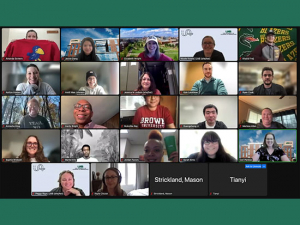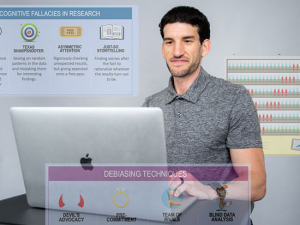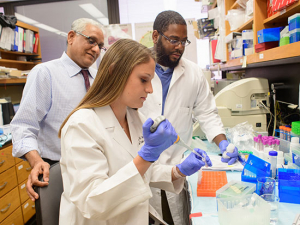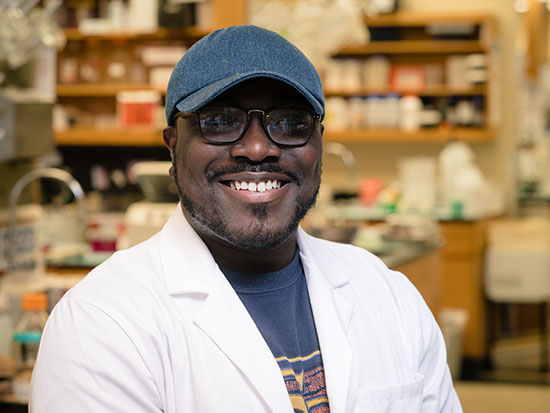 Martravious Stallworth, a senior at Stillman College, spent the summer in a UAB cancer research lab as part of the Partnership Research Summer Training Program, founded by UAB researcher Upender Manne.When he was in elementary school in Selma, Alabama, Martravious Stallworth had buddies who wanted to be pilots, firefighters and police officers. He only had one calling. “I have always said that I would like to become a doctor,” the Stillman College senior said recently.
Martravious Stallworth, a senior at Stillman College, spent the summer in a UAB cancer research lab as part of the Partnership Research Summer Training Program, founded by UAB researcher Upender Manne.When he was in elementary school in Selma, Alabama, Martravious Stallworth had buddies who wanted to be pilots, firefighters and police officers. He only had one calling. “I have always said that I would like to become a doctor,” the Stillman College senior said recently.
He’s getting close. After graduating with honors from Selma High School in 2015, where he was elected Mr. Selma High, Stallworth went to Stillman, a historically black college in Tuscaloosa, and majored in biology. He earned extra money as a certified nursing assistant working at a rehabilitation facility in his hometown.
But earlier this spring, Stallworth heard about a different kind of opportunity in an email from Stillman President Cynthia Warrick, Ph.D. How would he like a chance to spend eight weeks in a UAB cancer research lab, where he would be mentored by veteran scientists and young trainees alike, and present a poster on his research at a symposium in Atlanta? “She thought I fit the requirements,” Stallworth said.
So did Upender Manne, Ph.D., professor of pathology and director of the Translational Anatomic Pathology program in the UAB School of Medicine and senior scientist in the O’Neal Comprehensive Cancer Center and the Minority Health and Health Disparities Research Center at UAB. In 2013, Manne, a widely known and respected researcher studying racial disparities at the molecular level in colorectal and breast cancers, started the Partnership Research Summer Training Program (PRSTP). Its goal is to provide undergraduates, especially minority students, opportunities to work in the cancer research laboratories of UAB and learn more about cancer from physicians and scientists during the summer.
| The PRSTP program is under the auspices of a Comprehensive Cancer Disparities Research Partnership between Morehouse School of Medicine, Tuskegee University and the O’Neal Comprehensive Cancer Center at UAB. The partnership, which has been active for more than 17 years, receives funding from the National Cancer Institute of the National Institutes of Health. Manne is the principal investigator, and Isabel Scarinci, Ph.D., professor of medicine in the Division of Preventive Medicine, is serving as a multiple-principal investigator. |
This year, Stallworth was one of 13 students chosen to participate, the largest group ever for the selective program.
The PRSTP is part of a major, multi-pronged effort at UAB to tackle the profound cancer disparities seen in African-American populations. As is the case with many cancers, African-Americans are more likely to be diagnosed with colorectal cancer, and less likely to survive, than any other group in the United States. The O’Neal Comprehensive Cancer Center has received several major grants from the National Institutes of Health to work toward eliminating cancer health disparities, including a partnership with Morehouse School of Medicine (MSM) in Atlanta and Tuskegee University (TU) in Tuskegee, Alabama. The MSM/TU/UAB Cancer Partnership, often referred to by its NIH designation, U54, has been ongoing since 2006. In September 2016, it received a third five-year, $16.6 million competitive renewal grant.
Spreading the opportunity
At each institution, the partnership has increased substantially the critical mass of cancer researchers to conduct state-of-the-art cancer health-disparities research and increased cancer-research funding and outreach initiatives. But that is only part of the equation, Manne said. “We want to give opportunities to minority students to consider careers in health care professions to address cancer health disparities and help UAB and other institutions to recruit minority students into medical schools, allied health schools and graduate schools,” he said. “I thought, we need to spread this opportunity to other minority-serving institutions. In many of these institutions, students don’t have access to research laboratories or mentors to show them what’s possible. Many haven’t even held a pipette before. Our experience shows that this exposure helps encourage students to go into medicine and patient-care fields.”
During the past six years, the PRSTP program, funded by the UAB School of Medicine, has trained 68 undergraduate students. Most of them have come from designated minority-serving institutions, including Alabama A&M University, Alabama State University, Cumberland University, Fisk University, Howard University, Miles College, Morehouse College, Oakwood University and Stillman College.
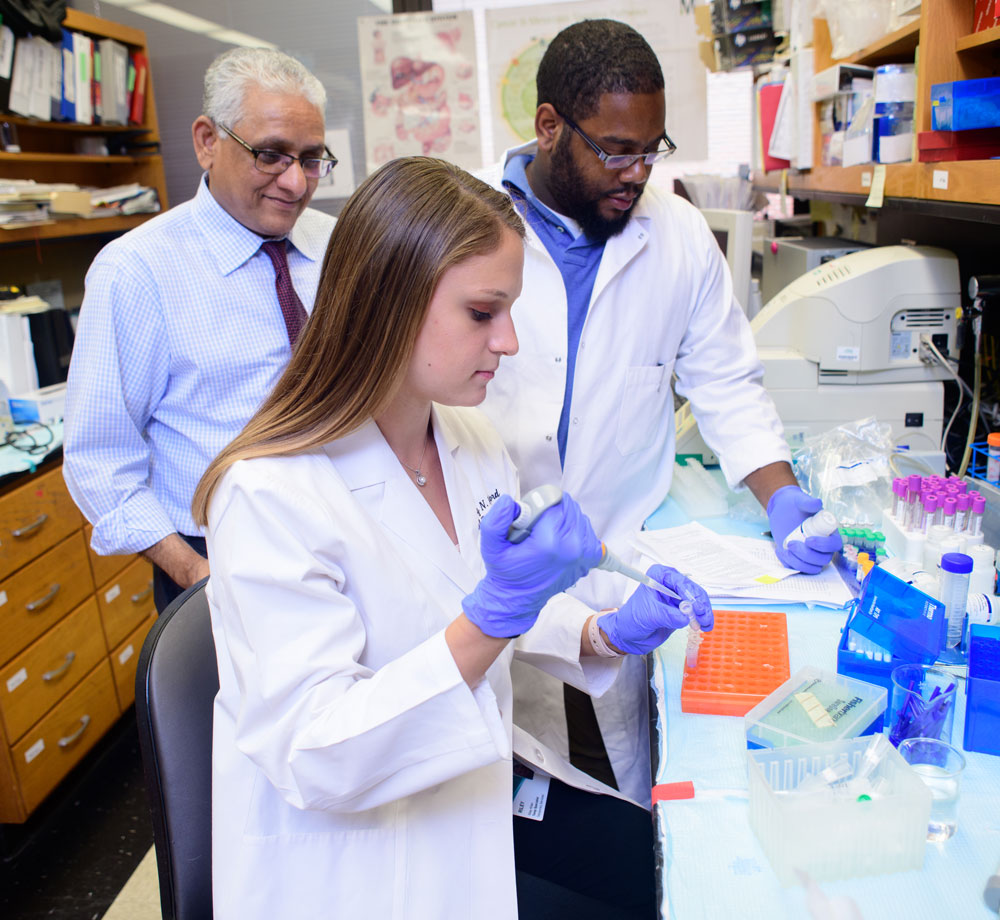 Riley Kilian (center), an undergraduate at Cumberland University, spent this summer working in the O'Neal Comprehensive Cancer Center lab of Upender Manne (left) alongside research technician Kevin Hale (right). Hale, a UAB graduate student studying biotechnology, is himself an alumnus of the Partnership Research Summer Training Program. Manne launched the program six years ago to bring more underrepresented students into research labs.
Riley Kilian (center), an undergraduate at Cumberland University, spent this summer working in the O'Neal Comprehensive Cancer Center lab of Upender Manne (left) alongside research technician Kevin Hale (right). Hale, a UAB graduate student studying biotechnology, is himself an alumnus of the Partnership Research Summer Training Program. Manne launched the program six years ago to bring more underrepresented students into research labs.
Going viral
Commitment to success for allUpender Manne’s development of and commitment to the Partnership Research Summer Training Program is a stellar example of the UAB shared values of diversity and inclusiveness, which calls for all members of the university community to actively seek varied perspectives. It also supports the community-engagement pillar of Forging the Future, UAB’s strategic plan, which seeks to “enhance student development as engaged learners, researchers and citizens by fostering community-based opportunities.” |
The PRSTP matches these student scholars with mentors in an O’Neal Cancer Center research lab. They spend eight weeks working nearly full-time in that lab, with additional training in scientific writing, poster preparation and presentation skills. (See “How it works.”) “The goal is to immerse these students in the culture of cancer research,” Manne said.
The program “really helps in recruiting minority students into our medical school,” Manne added. “Seventy percent are from minority backgrounds, and most of our participants have been African-American. We have an excellent track record — between 50 and 60 percent of our students are admitted into medical school, graduate school or nursing school, and others go into health-related fields to be nurse anesthetists or physician assistants, for example. We need these physicians and health-care workers and researchers to come to Alabama and stay in Alabama to serve our under-served populations.”
Stallworth spent his summer working in the lab of Chandrika Piyathilake, Ph.D., a professor in the Department of Nutrition Sciences and senior scientist in the O’Neal Cancer Center who studies the role of human papillomaviruses (HPV) in a range of cancers. Stallworth’s project looked at the prevalence risks of anal cancer in men having sex with men.
“This is my first internship dealing with anything like this,” Stallworth said. “I’m so thankful for the opportunity because I have learned a lot, as well as gained networking experience with students from different institutions. Here I am today making a way to fulfill my dream I have had since I was a little boy.”
Meet the students
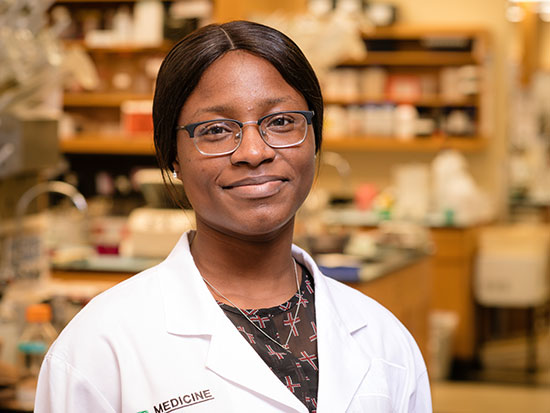 Sonia Okekenwa
Sonia Okekenwa
Rising sophomore, Fisk University
Okekenwa heard about the PRSTP program through her advisor in Fisk University’s honors program. This summer she worked with doctoral student Sweta Patel in the lab of Robert Welner, Ph.D., studying the effects of stromal cells in chronic leukemia. With Patel’s instruction, Okekenwa learned to perform Annexin V flow cytometry experiments to measure cellular death rates in various leukemia microenvironments.
| “It was an eye-opening experience. There are so many questions to answer in cancer.” |
“Sonia worked closely with Sweta, but she was doing her own project unique to her,” Welner said. “She was very motivated. I let the students in my lab set their own hours — and she was here 10 to 12 hours a day.” One of the most difficult things for a scientist to do is truly understand a research question, enough to be able to explain it to people outside of science, Welner added. “I care less about the results than that you grasp what is going on and that you can explain it to your Uber driver, or your mom. We worked hard on that.”
“My interest ever since high school has been in neurosurgery,” Okekenwa said. When she arrived at Fisk from her native Nigeria, however, “I got interested in research” as well, she said. Now, after her PRSTP experience, Okekenwa is considering an M.D./Ph.D. program. “I never knew research was so wide-ranging,” she said. “There are so many questions to answer in cancer — different aspects of every little seemingly minor detail. It was an eye-opening experience.”
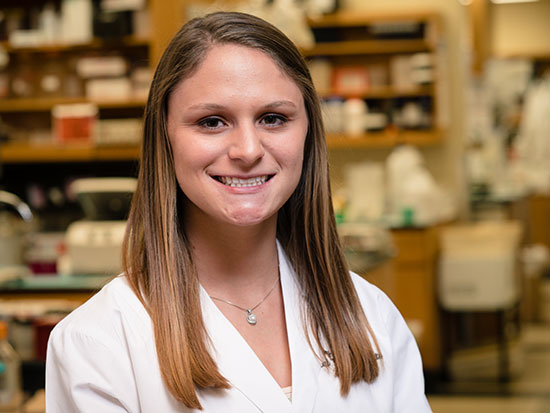 Riley Kilian
Riley Kilian
Rising senior, Cumberland University, Tennessee
Like many of her fellow PRSTP scholars, Kilian has been moving toward medicine for most of her life.
“I’ve been thinking about it ever since I was a little girl,” she said. Kilian is an elite runner, posting nationally competitive times and holding the Cumberland University records in everything from the 5,000 meters to the marathon. But her athletic career has been on hold several times as she recuperated from three ACL surgeries and several broken arms. “I would like to be an orthopedic surgeon,” she said. “I think I can be helpful to those who are going through injuries, both emotionally and mentally.”
At the same time, Kilian is painfully aware that breast cancer has run in her family for generations.
| “They were very patient with me and trusted me to do real work on my own.” |
Kilian worked in Manne’s lab on the molecular epidemiology of the TP53 gene variant, codon 72 polymorphism, the most common mutated gene in human cancers. (TP53 gene mutations are present in approximately half of all human malignancies and up to 40 percent of breast tumors.) “After joining this lab, I came to know that there are several types of breast cancers; unfortunately the triple-negative breast cancers, the most aggressive forms of all breast cancers, are more commonly found in African-American women,” Kilian said. She worked with Michael Behring, Ph.D., a postdoctoral fellow and molecular epidemiologist in Manne’s lab. “We looked at the effect of the body-mass index in survival rates of all types of breast cancers in African-American women compared with Caucasian women,” Kilian said. She also got to take part in lab experiments and conducted qPCR and cDNA syntheses. “Coming from a small school where we don’t have big labs, that was an awesome experience,” she said. “They were very patient with me and trusted me to do real work on my own.”
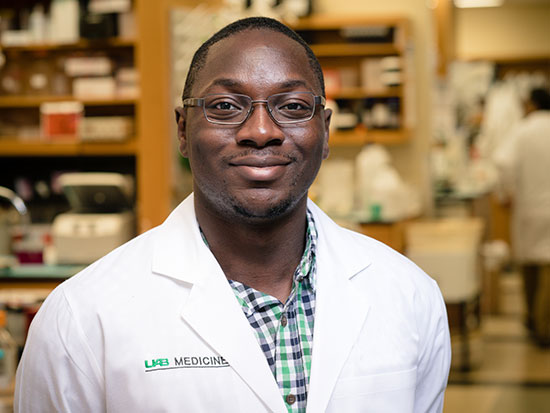 Leo Nkengbeza
Leo Nkengbeza
Senior, UAB
Nkengbeza graduated this spring with a degree in biomedical science from UAB. “I’ve really wanted to be a doctor since I was little,” said Nkengbeza, who moved from Cameroon to the United States at age 6. “Cancer has really high rates all over the world, particularly in the developing world, and is definitely something that needs more attention.” The PRSTP program “really opened my eyes to the importance of having different groups participate in clinical trials, especially African-Americans, who are very under-represented,” he said. “They put the spotlight on that to raise awareness and encourage others to participate in research.”
| “This opened my eyes to the importance of having different groups participate in clinical trials, especially African-Americans, who are very under-represented.” |
Nkengbeza spent the summer in the lab of Soory Varambally, Ph.D., an associate professor and director of Translational Oncologic Pathology Research in the Department of Pathology and a scientist in the O’Neal Comprehensive Cancer Center. Nkengbeza worked with graduate research assistant Alyncia Robinson and postdoctoral fellow Sumit Agarwal, Ph.D. “We were looking at the STIP1 gene, wanting to know what it codes for and why it’s overexpressed in lung cancer,” he explained. He learned experimental techniques such as qPCR and Western blot analysis during the summer. “It was a really cool experience because I haven’t had the chance to be in that setting,” he said. “I got to learn a lot and ask people around the lab, ‘What’s the purpose of this?’”
For the next year, Nkengbeza will be working in Birmingham with Impact America, an organization that is part of AmeriCorps, while he applies to medical schools. In addition to UAB, Nkengbeza plans to apply to the University of South Alabama, Vanderbilt and other schools. “Hopefully I will get into UAB,” he said.
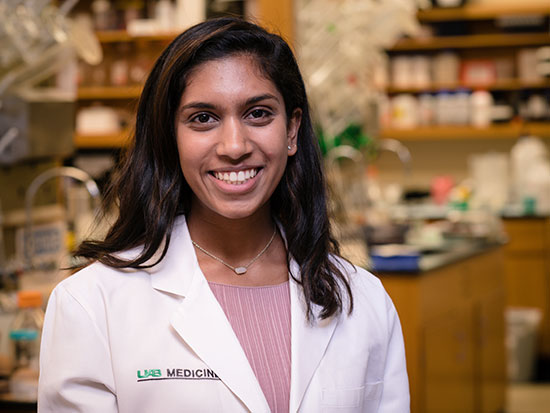 Archana Yarlagadda
Archana Yarlagadda
Rising sophomore, University of Southern California
Yarlagadda, who goes by Archie, has deep UAB roots. Her mother works in grants administration at the university, and her father is a pharmaceutical researcher at BioCryst, a UAB spinoff company. This summer, she worked on the UALCAN cancer-database project in the Soory Varambally lab.
“UALCAN collects data on the genes expressed in 33 cancer types,” Yarlagadda said. “It is very helpful to have all of that in one website versus looking through multiple papers.”
| “To be able to do all this the summer after my freshman year was amazing.” |
Although she had previously taken a lab-techniques course at the Altamont School, this was the first time she had been able to get hands-on with daily lab work such as Western blotting, qPCR and RNA isolation. Her project centered on the FEN1 gene and its expression in lung adenocarcinoma. “We were looking at expression data for people who smoke versus nonsmokers because FEN1 is a potential biomarker,” Yarlagadda explained. “Not just overall, but getting into whether it was overexpressed in specific races and genders, and we learned how important it is to consider patient demographics in developing effective prevention strategies to tackle cancer.” The work was inspiring, she added. “To be able to do all this the summer after my freshman year was amazing.”
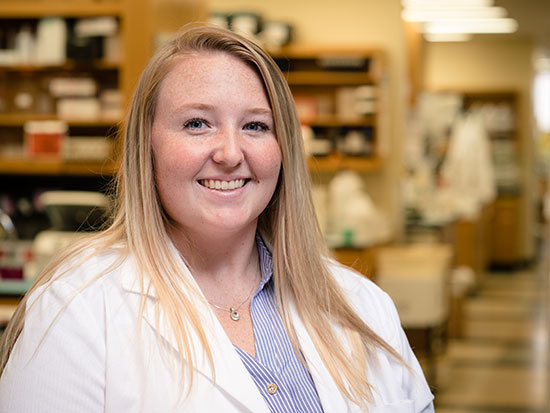 Bailey McDaniel
Bailey McDaniel
Rising junior, UAB
McDaniel has several family members working in health-care fields, including her mother, a nurse practitioner in Prattville. She entered UAB as a nursing major, but at orientation, she decided to switch to pre-med. “I liked the challenge; that’s been my goal ever since,” said McDaniel, a biology/pre-med major (with minors in chemistry and philosophy) and a member of the University Honors Program.
This summer she studied melanoma in the lab of Nabiha Yusuf, Ph.D., assistant professor in the Department of Dermatology and associate scientist in the O’Neal Cancer Center. “My grandfather passed away from melanoma,” she said. “That made me really interested in cancer research.”
| “This was my first research experience — and I really enjoyed it.” |
Although this was her first research experience, McDaniel quickly became adept at the histology techniques used heavily in Yusuf’s research. She was so skilled, in fact, that by late June “they offered to hire me long-term as a work-study,” she said. “It may not sound like the coolest thing in the world, but growing up I would always watch CSI and all these medical shows, and to get to do this as a job is very exciting.”
Building a cancer-fighting pipeline, step by stepThe longstanding partnership among the Morehouse School of Medicine, Tuskegee University and the O’Neal Cancer Center at UAB, which began in 2001, focuses on breakthroughs in the lab. But the partners are just as interested in encouraging diverse populations to break through barriers keeping them from careers in science. The National Cancer Institute-funded MSM/TU/UAB Partnership offers specialized programs that “touch everyone from undergraduates to medical and graduate students all the way up to junior faculty as they become independent researchers with their own labs,” said Ann Smith, training program director for the MHRC, which is a vital part of these educational efforts. Part 1: UndergraduatesThe MHRC’s Summer Enrichment Program for undergraduates at UAB and six historically black colleges and universities served as inspiration for the Partnership’s Cancer Research Immersion Student Program (CRISP) for undergraduates at Tuskegee. As do their counterparts in the PRSTP program, CRISP students work in UAB labs, participate in cancer-education seminars and get an education in career road-mapping, MCAT/GRE test preparation and scientific writing. “This way, we integrate all our educational components with each other to maximize the resources,” Manne said. Students participate for three consecutive summers, spending four weeks at UAB in their first year, six weeks in their second year and eight weeks in their final year. “They also do cancer research at Tuskegee during the academic year,” Smith said. Amber Dixon Abrams, M.D., who is now a first-year medical resident in UAB’s Department of Psychiatry and Behavioral Neurobiology, was originally considering a career in optometry before she became involved in the MHRC Summer Enrichment Program. “Before the program, I had never seen any African-American physicians,” she said. “It seemed a far-fetched dream for me to be able to achieve that.” But after participating in the program “and seeing many different physicians from many different backgrounds, it made it more realistic for me,” Abrams said. Part 2: Medical and graduate studentsThe eight-week Summer Cancer Research Education Program (SCREP), which began in 2002 as part of the MSM/TU/UAB Partnership, is open to medical and graduate students at Morehouse, Tuskegee and UAB, and has trained 216 students so far. “I saw how the things that we studied directly impacted my community and the area I grew up in,” said Kendra Royston, Ph.D., a recent graduate of the doctoral program in biology at UAB who is now working in industry. Royston participated in the MHRC Summer Enrichment Program as an undergraduate and in the SCREP as a graduate student. “It’s great to be on the front lines and be able to say that I’m a part of the research that is going to eliminate health disparities with regard to low-income areas,” she said. Part 3: Early-career researchersIn 2006, the MSM/TU/UAB Partnership added the yearlong Health Disparities Research Education Program (HDREP) program for junior faculty, post-doctoral fellows and medical residents or early-stage investigators. Each year, the HDREP supports six scholars, two from each institution. All scholars are matched with mentors and participate in workshops and faculty-development discussions throughout the year. They also participate in a grant-writing retreat and present posters on their research projects during the MSM/TU/UAB Partnership Cancer Research Symposium. Since the MSM/TU/UAB U54 Partnership was launched, the HDREP program has sponsored 72 scholars. Each gets specialized training “to increase their knowledge and skills to write manuscripts to publish in peer-reviewed journals and write grants in order to help them become independently funded researchers,” Smith said. “My participation in the 2013 cohort of the HDREP gave me the opportunity to be connected with a number of resources and people who have directly contributed to my career growth,” said Tiffany Carson, Ph.D., who is now an assistant professor in the Division of Preventive Medicine at UAB. “In addition to the training received through the lecture series, activities like retreats for manuscript-writing and grant-writing have resulted in me having a solid track record of peer-reviewed publications and successful grant funding.” Part 4: Pearls for those on the pathSuccessful investigators such as Carson and oncologist Racquel Innis-Shelton, M.D., an associate professor of medicine and director of the Multiple Myeloma Clinic at UAB, also share their career experiences in the new Transition Pathway Program, which began this past year, Smith added. “From undergraduate days all the way to becoming a senior faculty member, there are so many transitions and different routes a career can take,” she said. “They share these pearls of wisdom and advice on what they did, or how they handled a situation: how many times they had to submit a grant application before it got funded or how many graduate schools turned them down before they got in. But they kept going. That’s a message everyone needs to hear.” “We are all working at different pieces of the puzzle,” Smith continued. “We help equip researchers who are finding out new ways to slow or prevent cancer. Then we share this information with the community, to let them know how to better their health, and to recruit community members into our research projects and recruit students into our training programs. When you step back, it makes up a big circle.” That circle encompasses far more than the state of Alabama, Manne added. “These creative educational activities will aid in accomplishing the over-arching goal of addressing the cancer health disparities in our backyard, in the nation and in the world.” |
How it worksThe PRSTP scholars are selected by Upender Manne and a committee that carefully reviews applications. In addition to each student’s academic background, the committee wants to know why they are interested in cancer research. That information helps direct them to the appropriate mentor, Manne explained. “Students will say, ‘My mom or grandmother or uncle struggled with this cancer; that’s what I want to know more about,’” he said. “Based on that interest, I’ll contact one of our more than 300 cancer researchers on campus and find a match.” Students receive a stipend of several thousand dollars for their summer work, which “Dr. Manne carves out from a very tight budget to run this program, simply because he believes it is the right thing to do,” noted Thomas Ramsey, Ph.D., PRSTP project manager. “Our participants become stronger candidates to continue for advanced degrees in the fields of cancer research and patient care and eventually to progress as cancer research investigators. We track these students to assess the impact of PRSTP on their career, and more than 60 percent of these students are ending up in health-care fields.” In addition to their lab work, the scholars attend a weekly cancer-education seminar in which they hear from researchers and clinicians in a range of cancer-related fields. “We try to mix epidemiology, behavioral science, basic biology and clinical presentations,” Manne said. “We teach them about basic cancer biology, but also bioethics, epidemiology, biostatistics and scientific writing and manuscript preparation” in cancer-education workshops conducted by Ann Smith, education manager of the U54 Partnership and director of the training program in the Minority Health and Health Disparities Research Center. The summer culminates when the students present their research posters at the annual MSM/Tuskegee/UAB Partnership Cancer Research Symposium, which was held this year near Atlanta. In addition to the PRSTP, undergraduate students from Tuskegee participate in mentored research in UAB labs as part of the Cancer Research Immersion Student Program (CRISP) from the MSM/Tuskegee/UAB Partnership. During the past 10 years, CRISP and its predecessor, the Cancer Intern Program, have trained 62 undergraduate students. |
